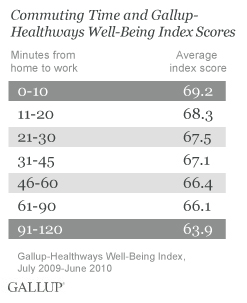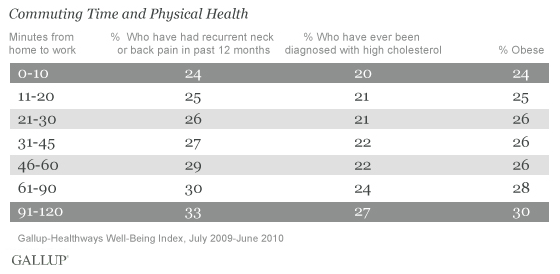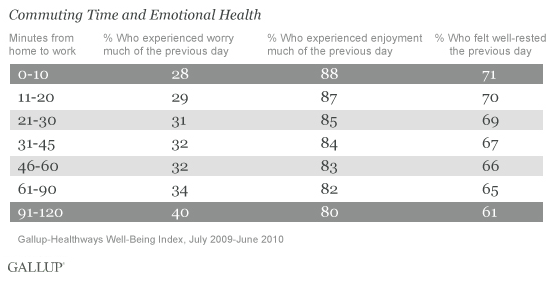WASHINGTON, D.C. -- American workers with lengthy commutes are more likely to report a range of adverse physical and emotional conditions, leading to lower overall scores on the Gallup-Healthways Well-Being Index.

American employees report an average commute from home to work of 23 minutes, with average times higher in most of the country's largest metro areas. About one in five U.S. workers (19%) spends more than half an hour getting to work, and 3% commute for more than an hour each way.
Those who do report long commutes are more likely to complain of several health problems. For example, one in three employees with a commute of more than 90 minutes say they have had a neck or back condition that has caused recurrent pain in the past 12 months; among those with commutes of 10 minutes or less, the figure drops to roughly one in four. Those with long commutes are also more likely to say they have at some point been diagnosed with high cholesterol and are more likely to have a Body Mass Index that classifies them as obese.

The psychological toll of long commutes may be as detrimental to individuals' well-being as the physical effects. Behavioral economists Daniel Kahneman and Alan Krueger in 2004 tracked the emotional states of employed women in Texas during their daily activities. They found that respondents' ratio of positive to negative emotions was particularly low during time spent commuting.
Gallup-Healthways Well-Being Index results also point to a connection between commuting and emotional well-being. Among employees who take more than 90 minutes getting from home to work, 40% experienced worry for much of the previous day -- significantly higher than the 28% among those with negligible commutes of 10 minutes or less. Conversely, workers with extremely long commutes were less likely to have experienced enjoyment for much of the previous day or to say they felt well-rested that day.

Implications
Gallup-Healthways Well-Being Index data add to the growing body of evidence that long commutes have negative effects on workers' well-being. These effects are present among full-time and part-time workers, and they hold up after controlling for respondents' age, education, and income levels.
The results imply that many employers may need to reevaluate their options for helping workers manage those effects, particularly in light of the costs associated with low well-being. Those who are hesitant to allow telecommuting, for example, may need to consider balancing the physical and emotional toll of long commutes against the social benefits of having employees together in the workplace. Employers should also recognize that it's not just the time lost in commuting that may have adverse effects. Particularly in tough economic times, commuting expenses -- whether they go to gas and parking or mass transit fees -- may contribute to elevated worry levels. Helping defray those costs may help employees make the long trek to and from work with greater peace of mind.
Learn more about the Gallup-Healthways Well-Being Index.
Survey Methods
Results are based on telephone interviews with 173,581 employed national adults, aged 18 and older, conducted July 1, 2009-June 30, 2010, as part of the Gallup-Healthways Well-Being Index. For results based on the total sample of national adults, one can say with 95% confidence that the maximum margin of sampling error is ±0.3 percentage points.
Interviews are conducted with respondents on landline telephones (for respondents with a landline telephone) and cellular phones (for respondents who are cell phone only).
In addition to sampling error, question wording and practical difficulties in conducting surveys can introduce error or bias into the findings of public opinion polls.
About the Gallup-Healthways Well-Being Index
The Gallup-Healthways Well-Being Index measures the daily pulse of U.S. well-being and provides best-in-class solutions for a healthier world. To learn more, please visit well-beingindex.com.
